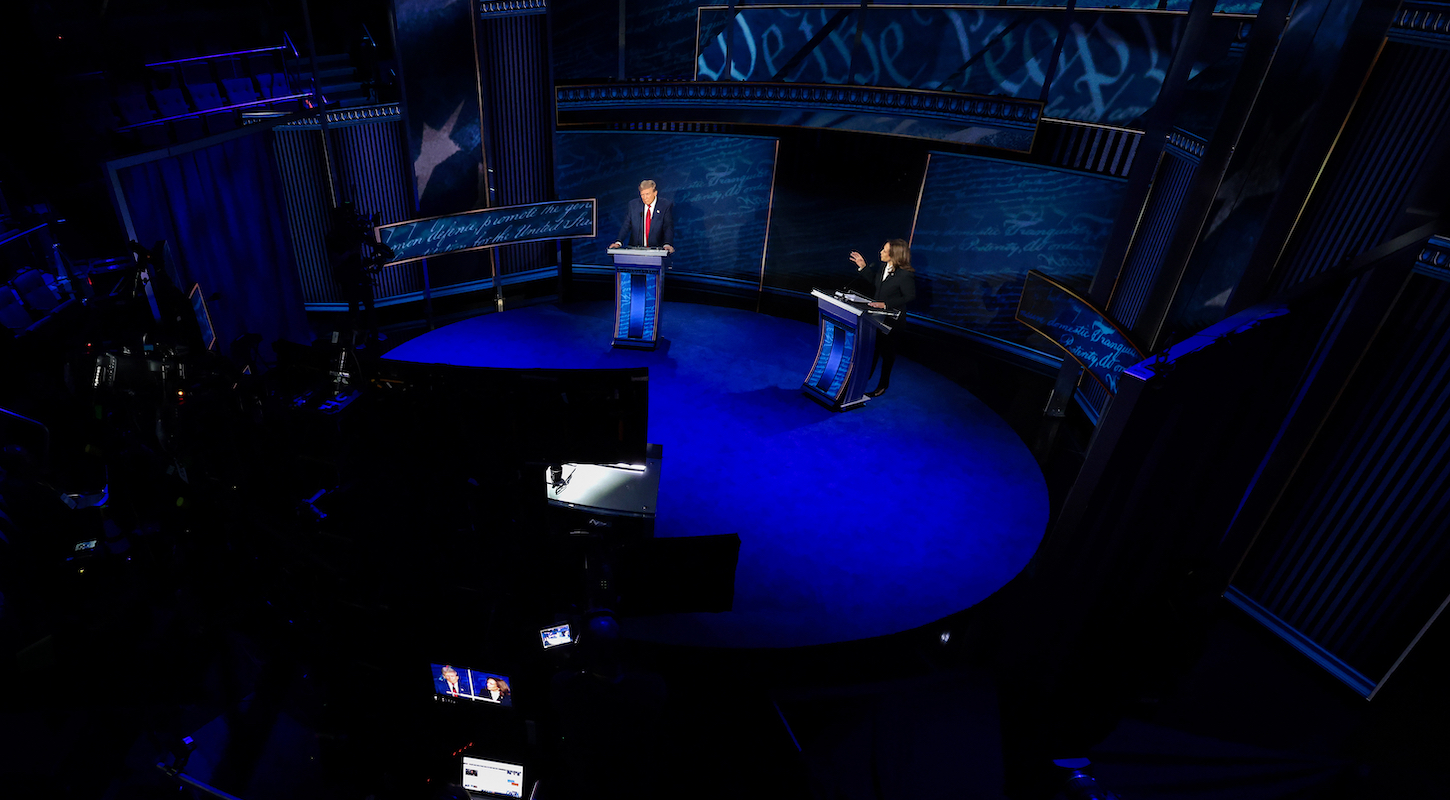Welcome to Margin of Error, a politics column from Tom Scocca, editor of the Indignity newsletter, examining the apocalyptic politics and coverage of Campaign 2024.
This week's presidential debate was never going to be about anything other than Donald Trump, the same way that the last presidential debate could only have been about Joe Biden. In June, the question was whether Biden had the strength and confidence to get his words out. This time, there was no doubt that Trump was going to talk; the question was what he would say.
The debate previews insisted that there was also a very important storyline about Kamala Harris to consider. Could the vice president educate the public about her policy agenda, which the politics press agreed—with a pre-debate New York Times/Siena College poll as evidence—had remained too vague through her rapid rise to the top of the Democratic ticket? Would Harris provide the necessary details for undecided voters to judge the merits of her ideas?
The policy stuff was nonsense coming and going. Last week, after being scolded by the Washington Post editorial board for "coasting on vibes," Harris announced a set of tax proposals, including raising the capital gains tax from its current 20 percent rate to 28 percent, with an accompanying increase in the net investment income tax surcharge from 3.8 percent to 5 percent. The press responded by writing about the vibes of it: how Harris had broken with Biden, who had been seeking a higher rate. The capital gains plan, the Times wrote, was her "attempt to simultaneously project a more moderate image and stand by the soak-the-rich populism that animates much of her party."
On debate night, taking the issues seriously meant asking Harris earlier, and at greater length, about why she'd changed her position to support fracking—a rote question about a rote bit of pandering—than both candidates were asked about the totality of their positions on the global climate catastrophe, a subject about which they hold diametrically, world-changingly opposite views. Harris's assignment wasn't to talk about policy; it was to deliver campaign messages while performing a role in a two-person improvised drama.
Trump has never understood himself to have any other kind of assignment, not even when he was invested with the actual powers and responsibilities of the presidency. One lurking unarticulated theme in the campaign is that Trump hated being president, so much so that he effectively quit doing the job day-to-day, and he appears to only be trying to win the office again to soothe his ravaged ego and to get himself legal immunity. Thus his repeated claim in the debate that all he needs to do to end Russia's invasion of Ukraine is to become president-elect: The universe will fall into order as soon as everyone just acknowledges his rightful place atop it. Trump is promising to solve everyone's problems, not to work on solving them.
And so Trump was there to talk about the problems. The difficulty is that since he lost his position on the mainstage in 2021, Trump has been performing for strange and narrow audiences. His plan remains the same plan it always was: to arouse and alarm undecided voters with a tale of a society and economy slipping toward collapse, besieged by hordes of foreigners and betrayed by enemies within, and to tell them Donald Trump represents change, strength, greatness, redemption. But the details have gotten twisted around themselves. Instead of a nice, clean wall on the Mexican border, he's turned to a promise to deport millions of undocumented immigrants, more undocumented immigrants than his opponents in the media say even exist, a crackdown so self-evidently brutal and unachievable that rather than try to sell it on national TV, he dodged the question from the moderators about how he would carry it out.
The point he chose to defend in its place was his claim that the immigrants are killing and eating the pet cats and dogs of Springfield, Ohio. "Well, I've seen people on television," he told ABC's moderator David Muir, when Muir pointed out that the city manager of Springfield said nothing remotely like that had happened. "The people on television say, 'My dog was taken and used for food' ... The people on television say their dog was eaten by the people that went there."
What higher authority could there be than the people on the television? "YOU STUPID MF’ers JUST GOT TRUMP TO REPEAT YOUR LIE ABOUT THE PETS," the usually shameless right-wing pundit Erick Erickson posted to Twitter. "CONGRATS ON SETTING THE NEWS STORIES TOMORROW BY LYING SO TRUMP PICKS IT UP AND SAYS STUPID SHIT."
But Donald Trump is, himself, the ultimate form of people on the television, and there was much more where that came from—impenetrable complaints and grievances, built around esoteric lore: She copied Biden's plan ... Execute the baby ... She's busing them in and paying them to go ... He let the Russians build a pipeline going all over Europe and heading into Germany ... Transgender operations on illegal aliens that are in prison ... The biggest pipeline anywhere in the world going to Germany and all over Europe ... 88 billion dollars' worth of brand-new, beautiful military equipment" ... Three and a half million dollars from the mayor of Moscow's wife....
Harris met all of this not with a list of initiatives but with a performance of her own. Her strategy for engaging with Trump was to get him talking defensively about the things he wants to talk about—the Wharton School of Finance; his personal fortune; his big, incredible rallies—while the home audience got established presidential motifs. She delivered an absurd, smarmy riff about Camp David worthy of Bill Clinton, accusing Trump of bringing "a terrorist organization called the Taliban" to negotiate at a "storied" place "where we invite and receive respected world leaders," as if those leaders hadn't included Menachem Begin and Yasser Arafat. She used the Barack Obama register of unity and racial harmony to flip the last decade of griping about Democratic identity politics, casting Trump as the person who won't stop talking about race: "We don't want a leader who is constantly trying to have Americans point their fingers at each other ... Regardless of people's color or the language their grandmother speaks, we all have the same dreams and aspirations and want a president who invests in those, not in hate and division."
And Harris had another familiar tone in her repertoire. Trump, she said, "basically sold us out" by helping China acquire microchips, and had let Xi Jinping off the hook for "not giving us transparency about the origins of COVID." World leaders, Harris said, "are laughing at Donald Trump"; military leaders "say you're a disgrace." In Afghanistan, she said, "Donald Trump, when he was president, negotiated one of the weakest deals you can imagine ... Even his national security advisor said it was a weak, terrible deal."
How could Donald Trump compete with a younger, more agile Donald Trump? Back on his heels, struggling to escape from his own success in getting the Supreme Court to abolish abortion rights, Trump abruptly pivoted to speaking frankly about how 21st-century American government works. Harris had just declared that she would sign the lost protections of Roe v. Wade into law, and the moderators were pressing Trump about whether he would veto a national abortion ban if a Republican Congress passed it. His answer was that it didn't matter what a presidential candidate said about abortion:
She'll never get the vote. It's impossible for her to get the vote. Especially now with a 50-50—essentially 50-50 in both Senate and the House—she's not going to get the vote. She can't get the vote. She won't even come close to it. So it's just talk.
You know what it reminds me of? When they said they're going to get student loans terminated and it ended up being a total catastrophe. The student loans—and then her, I think probably her boss, if you call him a boss, he spends all his time on the beach, but look, her boss went out and said we'll do it again, we'll do it a different way. He went out, got rejected again by the Supreme Court. So all these students got taunted with this whole thing about—this whole idea. And how unfair that would have been. Part of the reason they lost. To the millions and millions of people that had to pay off their student loans. They didn't get it for free. But they were saying—it's the same way that they talked about that, that they talk about abortion.
When he wasn't rambling, through muscle memory, into a pointless attack on Joe Biden, the ex-president was describing a reality that the press, holding piously forth about how the candidates need to share their policy visions, didn't dare to address. Thanks to the work of the first Trump administration and Mitch McConnell in the Senate, a Republican federal judiciary has seized for itself the power to carve away at whatever a Democratic administration might try to do. Legal arguments that would have been laughed out of court half a decade ago are now good enough to win nationwide injunctions from a right-wing judge. How do you hold an election about policy when the people with the last word on policy don't have to stand for election? The task of the next Democratic president won't be to implement some bold new policy blueprint, but to figure out how to keep the existing machinery of governance running at all.






